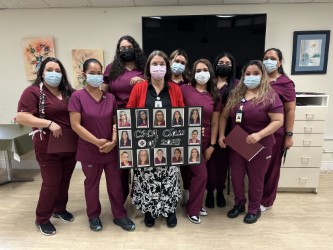Collect and Share Your Family Health History
- Category: Health & Wellness
- Posted On:
- Written By: LVMC

The COVID-19 pandemic has created a new look for many families celebrating Thanksgiving this year. With health experts suggesting avoidance of large, in-person gatherings, many families will instead celebrate “Zoomsgiving” using the popular video conferencing platform or other social distance means to visit with one another.
Thanksgiving is typically the time families share stories or update one another about how the year has progressed. Even without in-person celebrations, Thanksgiving can still be a time for families to share. Now, perhaps more than ever, getting information about your own family health history can be an important step toward making healthy changes for your future.
Thanksgiving falls on National Family Health History Day, so while you’re sharing Grandma’s sweet potato casserole recipe, why not also give one another information about major health or medical concerns. Healthcare providers suggest you know critical details about whether someone in your family has experienced heart disease or has factors such as high cholesterol, high blood pressure, and diabetes.
Why is it even important to know? It’s important to know your family’s health history, especially if multiple generations have a chronic condition that may lead to a shortened life span. Common conditions that tend to run in families include heart disease, diabetes, high blood pressure, and cancer, such as colon, lung, breast, and skin cancers.
Talk to your family members who may have a chronic illness or disease. Please make a list of which relatives have the conditions and your relation to them. Find out at what age they were diagnosed, and make sure your physician knows whether a parent or sibling has a specific disease.
Remember when you collect your family health history that you want to consider that the more information you get, the better. Conditions such as high cholesterol or blood pressure, or family lore about relatives having heart attacks, may not be enough. Ask about potential genetic factors. You can also delve into death certificates and obituaries if verbal information is lacking on some relatives.
When you learn important health details, taking action may save your life. For instance, if you are a female and your mother or sister had breast cancer, speak with your doctor about mammograms. Or if your parents or siblings have diabetes, it might be important to get screened yourself. Colorectal, or colon cancer, is another reason health histories are important. If your parents or siblings had colorectal cancer before the age of 50, speak with your physician about whether it is necessary for you to get colonoscopies before that age or to have them more often than typically recommended.
If you need help getting jump-started on writing a Family Health Portrait or history, the U.S. Surgeon General has an easy tool to help. Log onto https://phgkb.cdc.gov/FHH/html/index.html to help get informed about risks for conditions that run in families; print your family health history to share or save your history; it can be updated as needed.






